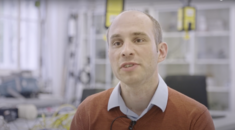Planet Earth is shielded by its own magnetic field from hazardous space radiation. However, this shield weakens during geomagnetic field polarity reversals and excursions that have occurred irregularly throughout the geological past. It very likely may happen again, though not in the very near future.
The ERC project GERACLE explores the impact of Earth’s magnetic field reversals and polarity excursions, past and future, on our habitat. The project covers the coupled Sun - Earth system to explore interconnected processes during unusual geomagnetic field states under a wide range of solar forcing and climate conditions.
The synergy grant pools the interdisciplinary expertise of scientists at GFZ Potsdam (PI Monika Korte), the University of Helsinki (PI Emilia Kilpua), the University of Oulu (PI Ilya Usoskin) and BOKU University, Vienna (PI Harald Rieder). The ~ 10 Mio. € funding granted by the European Research Council will provide training opportunities for more than 20 early and mid-career researchers combined at the four host institutions over the next 6 years.
The key ambition of GERACLE is to develop a unified Sun - Earth system model framework to investigate magnetospheric and atmospheric processes for varying geomagnetic, climatic and solar conditions using unprecedentedly accurate paleomagnetic records and novel models. A core goal of the project is to answer the longstanding question of how severe the effects of geomagnetic reversals and polarity excursions on the Earth’s environment can be.
The team at BOKU University led by Prof. Rieder will provide the expertise on chemistry-climate connections and earth-system modeling to the Synergy project. Through GERACLE the researchers expect to provide pioneering insights into changes in atmospheric composition during unusual geomagnetic field conditions and the related consequences for the exposure to elevated UV radiation at the ground, as well as changes in atmospheric circulation and potentially even regional climate.
The synergy project aims to unravel atmospheric, climatic and environmental effects of unusual geomagnetic field configuration and to estimate the related biological and technological impacts and to improve our understanding of the conditions under which life has been and will be evolving on Earth. The project is also expected to greatly improve our understanding of coupled Sun-Earth processes in various geomagnetic field states, in particular during extreme solar events. Thus, the project will not only provide new insights into Earth’s history, but also be relevant for future space weather conditions with potential implications for safeguarding technological infrastructure critically important for our modern society. The unified Sun - Earth System model framework with a rigorous characterization of uncertainties will open new horizons also for studies of other solar system planets and exoplanets.
Contact:
Prof. Dr. Harald Rieder
Institute of Meteorology and Climatology
BOKU University, Vienna
harald.rieder(at)boku.ac.at

